#Ahu'az
Explore tagged Tumblr posts
Text
聊聊俺另个冷圈子漫画《AFTER GOD》: 解析、猜测、评论(暂至第58话,英译版为准)
An analysis/speculation/ramble of the manga, After God.
Edit: Upon re-reading some previous chapters for my next ramble, I realized that Yako's name isn't actually "Furuya Yako," but "Furuya Rin" (C56). I'd like to change it accordingly.
The sort of things I'll do for you, @orange-peel-candy, man. Yes, this could have been our Discord conversation, but it’s been a long time since I contributed something to this garden, and the After God appreciator circle is once again, a cold circle (冷圈子) that I thought hey, Future Lyns will enjoy reading. Maybe someone else other than you will, too?
This is up to Chapter 58, "They Don’t Understand."
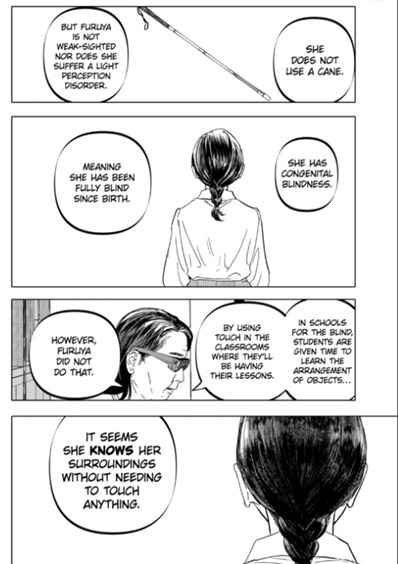
I’m gonna reiterate some of the interesting things we mentioned back in Discord.
The latest chapter is cool because it showcases how Yako sees the word. “No colors; just lines. Faces are blocked out.”
Apropos of that, I’m personally stoked to see the mangaka spending time establishing the different kinds of visual impairment that might get someone to be legally or functionally declared “blind.” Then, via the elimination method, we get to see just why Yako stood out even within the community she is easily a member of owing to her congenital blindness.
---------------
Blind Perspectives
In the first part of C58, we see the Outsider Auntie describing how much of a stand-offish creep Yako was. Her opinion is likely similar to what readers might have felt about Yako since she appeared in the story.
But, in the second part of the chapter, we got to see Yako reminiscing about her dad’s funeral, her mother, and—we soon find out—the first time she met Chicken (“Rooster,” this distinction is actually important, but I think I’ll make a separate post about it) God. In that flashback, she’s still a little peculiar... but is largely a quiet girl with pretty normal sensibilities. She was defensive of her mother’s character and questioned—but not disparaging of—her long-absent father. She even displayed kindness to a creature she identified as a “parakeet” found near her dad’s coffin.
Little thought that goes nowhere: Child Yako reminded me of a live-action character we really like: India Stoker, from the movie Stoker. They both elicit a peculiar bearing partially from their atypical sensory experiences, are seen as “unsettling,” and are left alone. Man, I dig characters like these. So ghostly.
This is why I’m very interested in C59: it will be a continuation of Yako’s memories of how the Chicken God and her life entwined. Sure, we’ll also get to her reputation as a butcher of eighty lives, but I’m at least 80% sure that the slaughter is related to Chicken God. How the slaughter happened (was it via her new power? Poisoning? etc..), though, is a lot less clear.
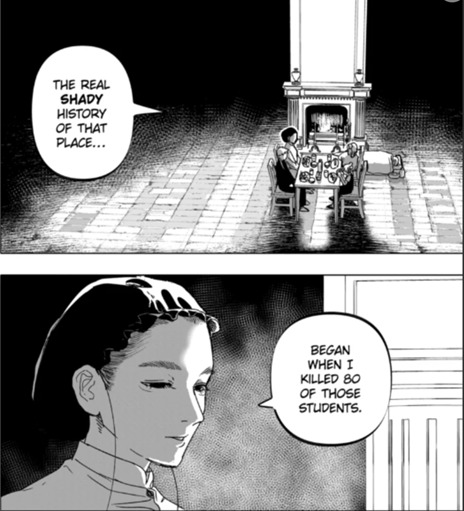
Juxtaposing Yako and Outsider Auntie’s perspectives like these made me wonder if Yako had always been as off-putting as the latter claimed. Could it be that, at first, Yako seemed weird because of her nigh-superhuman way of navigating through her blindness with an accuracy other peers like Outsider Auntie could only dream of? Did jealousy introduce a distortion to the Outsider Auntie’s assessment of Yako’s character?
As you pointed out: both narrators are unreliable.
I think that’s a good reminder. So here’s the follow-up:
Is the answer to who Yako is somewhere in between these two perspectives, or does it lie in a third position?
In other words: will Chicken God’s account of Yako’s personality end up being the most accurate version of who she is?
It won’t be surprising if the last part turns out to be true. Alula and Orokapi, who are both IPO/gods, seem to have the most accurate perspectives on Tokinaga compared to any other humans in the story—possibly including Tokinaga himself. Alula also seemed to have understood the sides of Shion that had eluded Waka until the time of their closure.
I think the gods’ impoverished understanding of humanity, plus their lack of emotional and experiential biases, actually gives the gods a clearer, fresher grip on the humans they are interacting with.
However, there’s a downside to learning about humanity with a blank slate. If you dip a piece of white paper into, say, a bucket of blue dye, you’ll get deep-blue paper. Then, no matter what color you try to paint on it later, the blue dye will influence how these colors present themselves on that paper, right?
That’s the second point—and hypothesis—I want to lead to.
-------------
Formative Experience
You observed that it’s strange that Chicken God relied heavily on others to do its bidding while Orokappi (and presumably others) show no such reliance. You’re right, and as always, you give me one really important lead-up to this hypothesis!
The gods described humanity as an infection, yea? We’re their Covid-19, monkeypox—you get the idea. Getting close to humanity, to them, risks being infected by our behaviors and ways of thinking.
In other words, the gods’ first and sustained interaction with one or more, humans greatly influences much of their personality development.
Orokapi
Orokapi’s first sustained interaction is with Tokinaga, who—due to knowing his OG’s sob story about being a loner with bad decisions and no friends (unless he wanted to include debt-collectors or whatever as “friends”)—offered Orokapi friendship with as little prejudice as possible. Even when Orokapi exhibited behaviors considered offensive, repulsive, or even disgusting, Tokinaga simply—persistently—corrected him and took care of him. Orokapi is Stitch to Tokinaga’s Lilo, y’all.
It’s pretty strange especially after we learned who Tokinaga actually is and what he really thinks of the gods.
But the main point stands: Tokinaga teaches Orokapi about friendship. The human notion of it, with all its complexities.
I argue that this is, therefore, Orokapi’s formative experience of humanity. This is his version of the humanity infection.
Orokapi is also notable among the gods for being one who embodies a human being. That is, he borrows a human body and lives like one—likely similarly to Allula. That affords him more formative experience with a human’s spectrum of emotional complexities—which again, because of Tokinaga, is related to the concept of friendship.
All of this culminated in his last run-in with the Rabbit God, Vollof. They had been dear friends before Tokinaga was a thing in Orokappi’s life, and yet Orokappi voiced vexation on how to help his dearest bunny-eared friend. Rabbit God was important to him, but Orokappi didn’t know how to be a friend. In the past, he could only provide surface-level help like alleviating Rabbit God’s drug withdrawal symptoms with his toxins.
However, in their last encounter, Orokappi demonstrated emotional intelligence and sentiments paralleling Tokinaga’s treatment of him. The Snake God had used what he had learned and finally gave Vollof the peace and comfort it didn’t even know it wanted.
This was Orokappi’s humanity infection, manifesting. And it looks a whole lot like platonic love.
Orokappi ate Vollof and subsumed Vollof as part of his “self”—this seems to be a property of these gods, as Allula also seemed to have gained her chimeric form this way (hers is characterized more as “lust” than love though if I remember correctly). Interestingly, he expressed similar sentiments toward Tokinaga and wanted to eat him too.
The intrigue posed by Orokappi’s desire to eat Tokinaga and the latter’s own profound suicidal ideation is better discussed in another post that talks more about my mate’s psychology. So I won’t continue beyond this point!
-----
This is the basis for my hypothesis as to why Chicken God relies so much on cult followers. I’m about 75% confident of it.
Chicken God Ahu'az
Here’s what we know:
Chicken God was found by Yako in her own house, near her dad’s coffin.
Yako’s mother founded an abacus school.
She had quite a significant number of students, who seemed less interested in abacus and more in her charisma (and beauty). After all, Yako’s mom “talked a lot” after teaching for a bit, basically making her more of an orator than a teacher.
Her school fees were cheap.
Outsiders characterized the school as “a suspicious group of people,” stopping shy of outright calling it “a cult.”
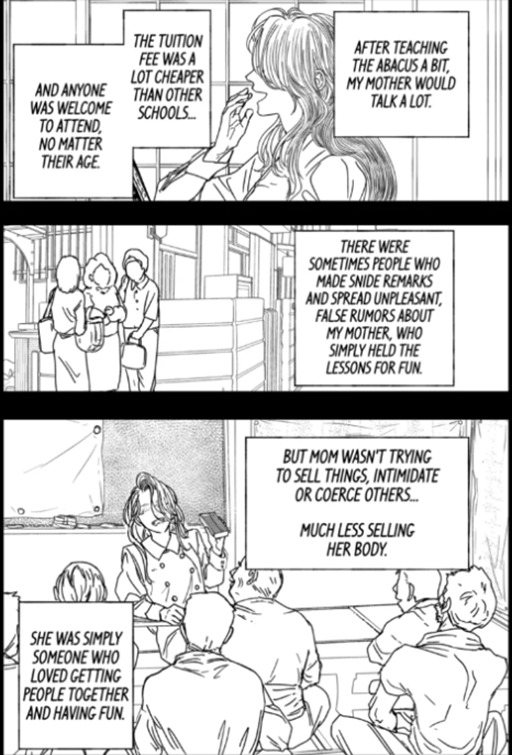
Here’s what we know about Chicken God:
Bruh is the god of a cult.
Bruh doesn’t kill all humans—it lets those who are sickly or weak live. Could this be pragmatic—giving these desperate human powers and a second chance will strengthen their faith in it? Or did it actually possess a soft spot for the marginalized and/or variously disabled?
Bruh relies heavily on its followers to do its bidding.
For a time, bruh lived in a pond near the Furuya’s house.
Chicken God seems to be the closest to Yako despite proclaiming its contempt for humans.
Chicken God presents itself to humanity instead of embodying a human form.
The lowered fees, and the stated purpose of her starting such a school in the first place, suggested that there’s a chance the school attracted marginalized people. People who may live on the fringes and were forgotten by society.
At this point of the flashback, all of the attendees were male. But that doesn’t mean this won’t change in the future. Perhaps following Yako’s murder, the school became an actual starting point of a cult.
Either way, going from what the rumors said, Yako’s mom’s abacus school likely showed a fervor toward her in ways comparable to a following. Chicken God was already living in proximity to a dedicated group as soon as it regained power and sentience.
This backdrop was Chicken God’s formative experience of humanity.
If Orokappi’s formative experience centers around friendship—what if Chicken God’s centers around worship?
Side note: this will once again pit the Snake God and the Rooster God as foils, especially considering how much the two seemed to hate each other’s guts. Friendship denotes equality between all parties, but worship demands a designation of the superior and its inferiors.
It wouldn’t be hard for Chicken God to assume the role of a god, either. The IPOs’ eyes already have a hypnotic quality inducing religious-like devotion toward them. The questions I can ask, therefore, are:
What happened to Yako’s mom? Was she eaten by Chicken God, and so come to assume a womanly form if it so wished? If this was true, then Yako’s feelings for the Chicken God could very well be mixed with a child’s affection towards her mother.
Or did Yako’s mom perish in the clash occurring between this cult and the government when they found out about Chicken God?
Who were those 80 students, and to what purpose were they killed? How did Chicken God factor into this?
Was the Chicken God’s habit of granting favors to the weak, disabled, and marginalized a pragmatic preference, or a result of its formative experience with humanity?
What was Yako’s mom’s role in all of this? Was she the first follower, and therefore the first priestess? Or was she horrified by the abomination her daughter had awakened (though hinted to be her husband’s finding; more on that later)?
The last question concerns the origin of the Chicken God. If I recall correctly, all IPOs used to live scattered across the globe, until for some reason, they began to gather in Japan. Correct me if I misremembered about this one.
This is where the little tidbit of Furuya Shigetoshi’s scholarly pursuit comes in.
-------------------------
“We joined him to take part in the excavation of Uruk.”
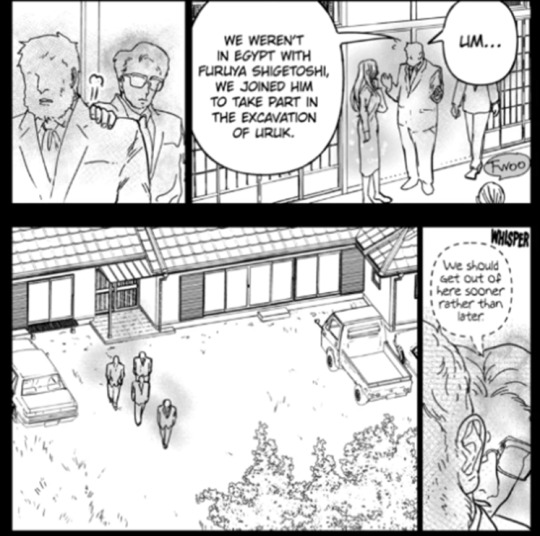
My neural network remembered Uruk enough to immediately think, “Mesopotamia?” So I went to double-confirm.
Yes, Uruk was an important city for Sumerian urbanization. It’s so ancient that it has multiple layers of cities built on top of an older city. It had seen quite a lot of rise and fall in its lifetime, including its annexation by the Neo-Assyrian Empire around 850 BCE[1].
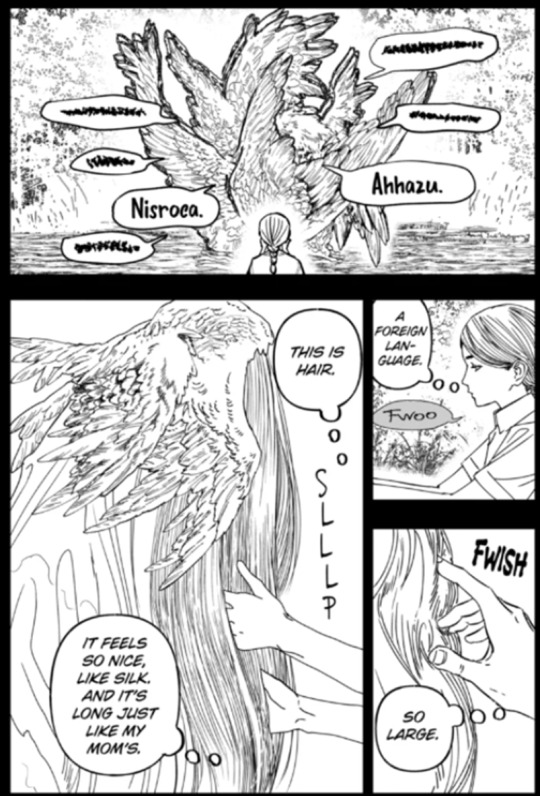
The actual name of the Chicken God, Ahu'az, seems fictional. But the word “Nirosca” reminded me of yet another thing I read before, so I went to check. Again. Well, the only thing that I found closest to it was “Nisroch,” which was some god of Assyria[2].
There had been a scholarly effort in trying to ascertain what kind of god Nisroch was supposed to be. Apparently, in the 1840s, a British archeologist had mistakenly identified “winged, eagle-headed genii[2]” figures as “Nisroch.” Near Eastern scholars nowadays refer to them simply as “griffin-demons.”
There are two points here that converge to one specific ancient Mesopotamian civilization: Assyria. I don’t know if this is the period Chicken God would reveal to have gained its first sentience, but I do wanna show you this Neo-Assyrian ivory sculpture[3][4].
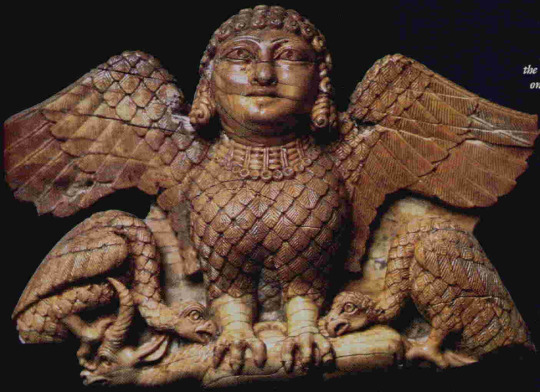
Assyrian winged Sphinx, excavated from Kalhku (now Nimrud).
From Yako’s memory, we learn that Chicken God wasn’t always a bundle of wings and some occasional chicken feet. It could even possess long, silky hair—one Yako compared to her mother’s.
Could our Chicken God originate from the Neo-Assyrian period of the Mesopotamian civilization, within the context of After God’s universe?
I’m 90% sure that it came with Professor Shigetoshi and somehow fell out of his person near his own coffin, which Yako picked up. After all, before these gods were “gods,” they seemed to be very microscopic—almost like bacteriophages, or something similar. It wouldn’t be surprising if micro-Ahu'az hitched a ride on a certain Japanese man—or if captured by him—and came here.
But of course, there’s this talk about how the IPOs had been moving to Japan despite their places of origin. Who’s to say that this wasn’t the directed work of someone, which would have allowed his job of exterminating these gods easier if they were all in one place? Perhaps someone even more ancient than the gods are supposed to be—and an enemy of them, no less...
---
Well! How the fuck did I get here?
And this isn’t the only After God hypothesis we have. There’s the one about the animal representations of each god which could lead to a full-blown essay about Tokinaga, your (unexpected) favorite character (thanks to me! Ahahahhaha!). Not that I mind. I really like Tokinaga too. He’s so juicy and interesting—and Orokapi is just as intriguing too.
Hopefully, other fans of this manga will find this an entertaining read. If you’ve stuck out here for this long—
Thank you for reading my ramble!
-----------------------------
Citations:
“Uruk” in Wikipedia. https://en.wikipedia.org/wiki/Uruk
“Nisroch” in Wikipedia. https://en.wikipedia.org/wiki/Nisroch
“عاجية اشورية تظهر طائر برأس انسان من كالخو ( النمرود حالياً ) القرن التاسع ق.م” in History of Mesopotamia. Twitter. https://x.com/GilgameshIQ/status/1537489293500899329
Nimrud Ivories عاجيات النمرود in Iraq In History. https://www.abualsoof.com/61-assyrian/detail/8604-assyrian-empire-age?tmpl=component
#after god#after god manga#after god meta#Ahu'az#furuya rin#after god yako#orokapi#tokinaga sachiyuki#ramble with citations#睿得失这个话痨的长篇大论
37 notes
·
View notes
Text
ohhh after god could pop off so well with yako & ahu'az. this one specific version of them in my head.
#after god#c.txt#you have orokapi/tokinaga. the mess that is shion/waka/alula. and then on the other side you have yako/ahu'az. i see it all
6 notes
·
View notes
Text
What would Obikawa think of trans people
#Obikawa voice: All women are queens#Kind of a stupid question assuming IPOs aren't restricted by any gender binary#Is Ahu'az's gender ever specified?
2 notes
·
View notes
Text
after god observations
so I've read After God 6 months ago but recently in October it just absolutely out of nowhere FULLY seized my hyperfixation to a level so intense I'm genuinely so startled. I haven't felt this normal about a piece of media in YEARS holy moly.
the English fandom is so miniscule so hella I was SO happy to find there's an After God tumblr corner. anyway first post, hello anyone who stumbles across these ramblings... warning this gets kinda rambly but it's just me being gushy about the series.
abt me I don't actually frequent tumblr that much, I'm kinda new in terms of experience, although I just have some social anxiety over talking about things I like publicly so I hope this sideblog gives me a little bit of strength talking to the void. I need a place where I can go INSANE over this series anyway WAHOO!! maybe will also post fanart in the future also, maybe!
there seems to be a much larger fanbase in Japan (mangaplus/urasunday where the original Japanese is posted gets hundreds of comments as opposed to English's official publisher on comikey. albeit I don't think comikey's the best at making it accessible either). Mangaplus/urasunday do post the latest 1-2 After God chapters for free on the website btw for folks who like to read ahead. Unfortunately anything before the latest 2 chapters is region-locked to the app and I don't really want to bother trying to figure out how to get it but that's what I'm mostly aware of.
I've seen some mixed reviews in the English side, though there's only a handful really out there, but most times I feel people are missing the point!!!! AHHHHHH!!!
when I first read the series 6 months ago, I didn't think of it that much except it shared some similar ideas to my own existing original work I thought would be cool to draw some inspiration off of. I'm honestly not really sure what happened in october, but I think it started because I gave it a second reread. And SO MUCH suddenly clicked. I didn't skim the dialogue as much and began to reexamine scenes and panels with the foresight of the later chapter events. And I fell absolutely in love. preordered and got the first volume in english on release date yippee!!
the first volume or chapters 1-8 is admittedly pretty much an exposition dump, but I think that rough start is kinda to be expected for most series trying to get a reader hooked into a new world. chapters 9-20 are really where things start kicking. It leads you to think Kamikura Waka is shounen-type protagonist like one chosen hero vs the big threat, but then breaks down into a more raw, mature look at the complicated lives of normal people who're just trying to survive, find their own happiness, and fight threats they only somewhat comprehend.
are IPOs really that different from humans? But not in the sense "humans are worse and gods are better" or "humans are better and gods are worse", but in the sense that "we're all equally messy in the same way, just trying to exist because that's all we know what we want to do."
I feel it's a story that needs to be read with the attempt to understand the characters as people with layers of contradiction and their relationships with one another. That's where so much of the meat and the weight of After God comes from for me, and many of these "this was disappointing" reviews don't really seem to even notice that part at all or tend to be confused why the characters act the way they do.

/// spoilers ahead!! talking about some of my observations and thoughts
I can't really remember where it was if there was a more explicitly stated spot that Ahu'az takes the form of what people see as most beautiful (at this point I'm wondering if I'm hallucinating this up oh god). Closest thing with the implication this is the case is in Chapter 34 when Yako/Furuya asks "what form did the God Ahu'az take for you?"
if this is the case though and it changes from person to person's perspective... then oh all the more tragic when Shion went to see Ahu'az and saw Waka/Alu'la as her most beautiful person.... DOOMED YURI, FUCK



--
obikawa saying "wow it's cooler here than I expected" back in chapter 9 really gets a new perspective when you apply the later reveal how IPOs are basically born


--
silly thing to wonder about, did the florescent banana tee Obikawa gave Tokinaga somehow become the saving grace that stopped him from getting eaten lol?



he is such a loser (affectionate) though like TOKINAGA YOU'RE LITERALLY 10 STEPS AWAY FROM YOUR HOUSE YOU CAN GET CHANGED!!

--
Tokinaga talks about being afraid of bathtubs chapter 17, and then on a reread I noticed he is standing in front of a bathtub in chapter 3. what kind of hell happened to you my guy omfg




--
I know that damn Default CSP Rubble Asset when I see it!!!!


pattern recognition throws me out of the loop a lot I work on comics in CSP as well and now I don't read webcomics the same way anymore oops. right off here I think it's pretty safe to determine After God was drawn in CSP; assets can't really be converted to other programs.
more CSP assets I recognized:
this hatching brush for the outline of Tokinaga here is ベタ線新 from this set
Nayuu's tree branches are from this set
and I'm pretty sure the water here is from this blood set, which might appear elsewhere a few times (i see these shapes in my dreams. this blood set haunts me so bad)



to be clear this isn't a critique or "using assets is bad" at all. normal readers are not going to notice these things. (in which i'm not normal i study Eno's art so intensely because i admire it so much). when making comics or other repetitively drawn works, artists will take shortcuts and should absolutely take shortcuts. it's just neat to share what tools were used for those curious!
off topic on the topic of csp if anyone would like the link, she's shared the brush she made for drawing Vollof here too!
--
I can't freaking imagine how it feels to have your beloved friend melt away on your lap between your fingers like that unholy
if you squint much, you can make out both Yoriko and Tokinaga overlaid in the speech bubble, though I'm not sure what the next one really says
but ahfjhfgifgh!!! the book being animal anatomy is such a stab in the leg cherry on top



(and it's probably an art error but tokinaga's pinky is back/weirdly has a solid shape there instead of it being flabby glove. wani asks how did tokinaga get there before he and yoriko so silly weird theory its tokinaga from a different time iterative loop? wonky. probably still an art error though)
--
so how did Alu'la get "reincarnated" within a human? How does an IPO get reincarnated at all? We've seen orokapi needed to eat a human to become a specific human. Alu'la definitely didn't eat a human.
We hear from Orokapi he drank seawater mixed with sewage and gained the intelligence that way. Closest I could think of are the microbiota that make up an IPO and their abilities. Maybe Waka's parents or Waka drank shit water of the sort and got the microbiota inside her that way or idfk
--
Thanks Tokinaga for the "uses chopsticks to eat everything" rep 🔥🔥

--
i'll leave you on that this is getting too long AHHAAHAJF thanks for reading, hope you got something cool out of this post! :]
#after god#after god spoilers#rambles#theories#technically a review of the series i guess? not officially but they are my thoughts#after god was drawn in csp btw anyone else recognize more assets#the queercoding is so freaking intense in this series#its making me think about how i want to love too#they might not be inherently romantic but they're absolutely not straight!!!
36 notes
·
View notes
Text
". . . and if her foot steps salted the earth? I would still worship the ground she walked on. //
and made sure nothing but flowers bloomed in her wake."


-Kamikura Waka / Alula to the goddess Ahu'az, from "Chapter 3: Hallucinations of an In Vitro Ark" After God
3 notes
·
View notes
Text
Orokapi eventually returns back to Tatsuno Yoriko her family.
500 words, gen, No Archive Warnings Apply. Written for Day 3 of @aftergodweek under the prompts for Tatsuno Yoriko and Minami Akio.
Yako retains unfamiliar permissions to the rest of those under Ahu'az.
700 words, gen, No Archive Warnings Apply. Written for Day 4 of After God week under the prompt IPO (gods).
#after god#after god manga#aftergodweek2024#my fic#i wrote these 2 exclusively within the hours of 11 pm - 12:15 am.. did no editing..#ive got no more contribution to the week thank u for reading.#however i will be thinking more about ahuaz and yako.#i had to scroll through my blog to find my fic tag and i realize that i have so much cleaning up to do . please help.
10 notes
·
View notes
Text
wauke: Ahu'az told me that, long ago, there were gods who had children with mortals-
yakou: i think i hauve covid
after god mondayyyyy oh fuck godfucking might be real in after god universe
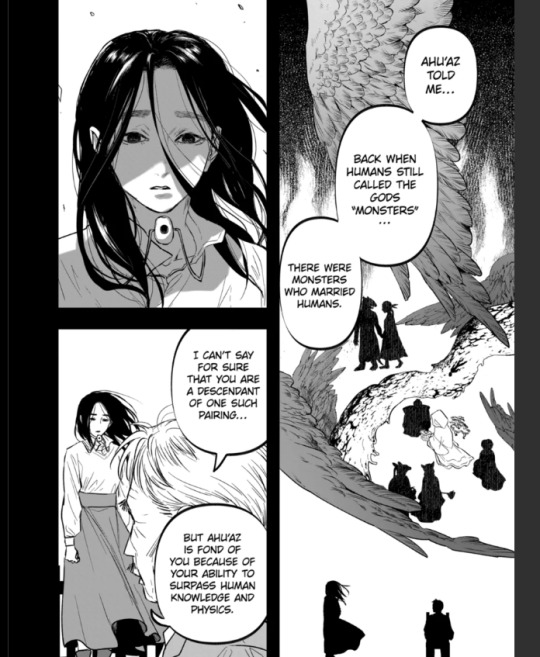
4 notes
·
View notes